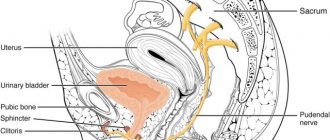Every person who has had a sad period in their life has said at least once in their life: something has tormented me with depression . In fact, true clinical depression is a very serious mental illness treated by psychiatrists and is the most common mental disorder, affecting one in ten people over 40 years of age.
Women suffer from depression twice as often as men, a third of patients are elderly, and this disease often affects children and adolescents aged 10–16 years. According to the World Health Organization, depression is one of the leading causes of teenage suicide.
Melancholy, blues and spleen
Many people believe that depression is a disease of modern civilization with its frantic pace, but this is not so. Symptoms of depression have been described since ancient times, starting with Hippocrates . In the old days, depression was called melancholia, hypochondria (Russian blues) or spleen, and this condition was well known, for example, to the poet Alexander Pushkin , otherwise how could he have diagnosed his Onegin so accurately?
An ailment whose cause should have long been found, similar to the English spleen, in short: the Russian blues took possession of it little by little; He didn’t want to shoot himself, thank God, but he lost interest in life altogether.
Give your partner privacy
Treatment for depression will always be a mess. It's like letting your cat trample in the paint and then run across the white sheet. It seems that your treatment plan has been worked out in detail, goals have been set, everything is neatly recorded in your observation log, and you are vigorously moving along the right path.
But one morning the patient wakes up and feels hopeless... Everything is bad, so much hard work has been done, but nothing helps, my soul is still empty and terribly sad. It would be better now to curl up into a ball of sadness and renounce the whole world.
This happens, and it’s natural. But at these moments you want to either give your patient a good kick so that he stops being sour, or completely abandon the treatment, because it does not bear fruit. Take your time, one bad day is not the end of the world. Although your love will not be the main cure for depression, it is still important for the patient, says psychotherapist Rita de Maria.
Rita de Maria
psychotherapist
Your love, your presence, your warmth are certainly needed by your partner. It won't stop depression, just as it won't, for example, lower your blood sugar or relieve arthritis pain. However, your feelings can change the “broken” processes in your partner’s head, revive his positive thoughts and increase his self-esteem during this difficult period.
Depression radically changes your normal life. What made you happy ceases to make you happy; what fascinated or interested no longer evokes even a drop of emotion. The presence of someone nearby who accepts this state without judgment or offense is very supportive and even inspiring.
Symptoms of autumn blues
- Constantly low mood.
- Feelings of sadness, anxiety or guilt.
- Decreased interest in the outside world, loss of motivation at work.
- Apathy, indifference to surrounding people and phenomena.
- Feeling hopeless and losing the ability to experience joy.
You should be wary if at least three of the above symptoms are present and if the depressed state is especially pronounced in the first half of the day, and after 16 hours there is a noticeable improvement.
How to determine if you have depression?
Pathology may appear after experiencing stressful situations. If there is no disorder, after the problem is resolved, the person returns to a good mood. But when the cause has been eliminated, and the person continues to feel apathy, depression and loss of strength, it is necessary to seek help from a specialist. Performance may also decrease.
You can determine the presence of depression yourself, but you should not self-medicate even at an early stage of development. This should be done by a doctor, since self-medication can only make things worse.
Depression in women often occurs postpartum, as their lives change dramatically, and sleepless nights add to their fatigue. This is where breakdowns and apathy appear.
When the pathology is in an advanced form, a person experiences the following symptoms of depression - not only bad mood and impotence, but also persistent disorders of the nervous system. There are also symptoms such as: a significant decrease in self-esteem, maladjustment in society, despondency and loss of interest in any events.
Physiologically, appetite changes, intimate needs and energy decrease, sleep and intestinal functions are disturbed (constipation, weakness, fatigue during physical and intellectual stress are observed), pain in the body (in the heart, in the muscles, in the stomach).
The patient exhibits signs of depression such as loss of interest in other people, a tendency to frequent solitude, refusal of entertainment, use of alcohol and psychotropic substances.
Mental signs of depression include difficulty concentrating, concentrating, making decisions, slowness of thinking, a pessimistic view of the future with a lack of perspective and thoughts about the meaninglessness of one's existence, suicide attempts, due to one's uselessness, helplessness, and insignificance.
Symptoms of autumn depression in women
- Guilt.
- Yearning.
- Fear, causeless anxiety.
- Increased fatigue.
- Increased emotionality, tearfulness.
- Sleep disorders, insomnia.
- Sudden mood swings.
- Cravings for flour and sweets, which causes women to overeat in the autumn-winter period and contributes to excess weight gain.
Autumn depression can be mild, moderate and severe. You can fight a mild form on your own, but in more severe conditions it is better to consult a specialist. The main criterion here is the presence of criticism of one’s own condition. If you realize that your melancholy is temporary, that it’s just bad weather, that you need to sleep or eat something tasty and everything will pass, then you can control your condition yourself. But if you don’t see any improvement at all, it seems to you that improvement will never come, then it’s better to see a doctor, and not necessarily a psychiatrist right away – you can start with a psychologist or a specialist in neuroses.
Diagnosis and treatment of depression
—
To identify the disease, experienced specialists use short questionnaires - screening tools to identify symptoms: anxiety, anhedonia (loss of pleasure in life), suicidal tendencies. Thanks to this, it is possible to determine whether the patient has chronic depression, symptoms and methods of treating depression, what form it is and its severity.
To fully understand the picture of the disease, the doctor needs to become familiar with the symptoms that indicate depression, and not another psychological disorder.
To treat depression, you can contact the following specialists:
- Psychiatrist - treatment of depression with hypnosis, medications for acute mental pathologies - schizophrenia, mental retardation, epilepsy, as well as other less severe illnesses - neuroses, depression, alcoholism, drug addiction, etc.
- Psychotherapist - treatment is carried out through special therapy, which involves explanations, conversations, and searching for solutions to problems together with the patient.
- Psychologist – advises the patient, cannot prescribe medications or examinations. Clinical psychologists use modern testing methods to identify problems that cause psychological disorder.
The main directions of therapy in treatment are psychotherapy, pharmacotherapy, social therapy.
Cooperation and trust in the doctor are noted as a necessary condition for the effectiveness of treatment. It is important to strictly follow the prescribed treatment regimen, visit your doctor regularly, and give a detailed report of your condition.
How to deal with autumn depression
If you think that you are able to cope with seasonal depression on your own, then give the main role to “antidepressive” nutrition, exercise and proper sleep.
Eat more foods containing protein (meat, fish, dairy products), as well as fruits and vegetables, including bananas, dates, citrus fruits, especially grapefruits. A couple of slices of dark chocolate will help produce “joy hormones”, which also cope well with depression. But it’s better to refrain from eating buns and cakes - depression will not go away, but the feeling of guilt for “breakdowns” and extra pounds is guaranteed.
photl.com/
To normalize your sleep, give up coffee in favor of green, or even better, herbal tea or herbal infusions. Decoctions of linden, mint, and thyme will help you here. Try to go to bed at the same time, read your favorite book at night, but it is better to minimize communication on social networks and absorption of negative news from TV.
Sport is a great winner against depression - jogging, fitness, yoga, swimming pool, walks in the fresh air. If you have a dog, then increase the time you walk with it, and if you don’t have a pet yet, then maybe it’s time to think about getting one? As you know, animals are the best antidepressants in the world, and cats are simply happiness-producing machines.
How can a man get out of depression on his own?
Despite the fact that depression was included in the international classification of diseases quite a long time ago and was recognized by the world medical community as a dangerous disorder, many people, especially in Russia, still do not take it seriously.
They think it will go away on its own, compare it to laziness, or accuse a person suffering from a depressive disorder of being spineless and irresponsible. And this is a huge risk, since without proper help, mental problems will only get worse. And against their background, the accompanying “responses” of the body will develop.
pixabay.com/Pexels
“Since depression is based on an imbalance of bioactive substances, hormones and even the immune system, it increases the risk of dangerous diseases,” says Christina Wirth. “Against a background of depression, the risk of cardiovascular diseases and infectious diseases increases.”
It is important to take into account that you can get out of depression on your own only if it developed against the background of a problematic situation and at some point the problem was resolved. This improves a man’s emotional state and helps him regain his zest for life. If the problem is “prolonged”, depression develops over a long time, and it becomes impossible to get rid of it on your own.
After all, physiological processes are added to the psychological disorder, hormonal imbalance occurs, and the production of neurotransmitters in the brain is disrupted. And to correct the condition, the help of a specialist is needed. Otherwise, improvements may be temporarily observed against the background of the disease, but depression will regularly return and intensify for no apparent reason.
“Self-healing is possible with mild depression,” comments the doctor. — The maximum you can do on your own is to find psychological literature, self-help manuals, read them, try to work with yourself. But there must be a will for this, there must be faith in one’s own strength, and the aid itself must be professional.”
pixabay.com/
Autumn depression in men
In men, autumn depression manifests itself with slightly different symptoms, including the following: anger, boredom, self-pity and irritability. At the same time, men, as a rule, act on the principle of “knock out fire with fire” and try to throw themselves into work at this time. And here, oddly enough, autumn depression can serve them well. Men become more assertive and persistent in achieving their goals, which is usually noted by their superiors and contributes to career growth. The main thing here is not to overpress the spring, so as not to break from excessive loads.
The main thing to remember is that alcohol does not help cope with depression, but only contributes to feelings of guilt, which only worsens the blues. This rule also applies to women.
Causes of the disease
These manifestations become a “marker” of processes that occur inside the body. Scientists have not yet figured out the causes of depressive disorders, but they agree that dozens of biologically active substances in the body are involved in them.
Clinical depression in men is not just a bad mood. This is a disease that affects the hormonal and immune systems, but mostly affects the functioning of the brain, as it disrupts the production of neurotransmitters responsible for emotions, reaction speed and performance.
Some external “push” usually leads to the development of depression:
- problems at work;
- dismissal;
- dissatisfaction with personal relationships;
- lack of career growth and financial well-being.
At different ages, the reasons may be different, but the processes occurring in the body of a man at 30 years old with depression do not differ from those at 40 and 50 years old. An external push triggers a cascade of biochemical reactions in the body, and it is not always possible to stop them on your own, without the help of a specialist.
pixabay.com/
Treatment of male depression at the Leto clinic
The goal of treatment is to relieve or eliminate symptoms, restore work, family and social functioning, and prevent relapse. One of the first tasks is to decide whether treatment will be done on an outpatient basis or in a hospital.
Treatment methods vary: medications, psychotherapy, psychoeducation, self-help methods, electrical stimulation therapy, light therapy, or combinations of individual methods. It is an integrated approach to treating depression that provides the greatest results.










